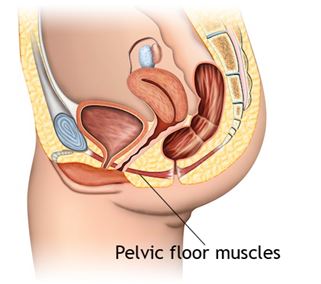Womens Health
What are The Pelvic Floor Muscles?
The floor of the pelvis is made up of layers of muscle and other tissues. These layers stretch like a hammock from the tailbone at the back, to the pubic bone in front.
A woman’s pelvic floor muscles support her bladder, womb (uterus) and bowel (colon). The urine tube (front passage), the vagina and the back passage all pass through the pelvic floor muscles. Your pelvic floor muscles help you to control your bladder and bowel. They also help sexual function. It is vital to keep your pelvic floor muscles strong.

Why Should I Do Pelvic Floor Muscle Training?
Women of all ages need to have strong pelvic floor muscles.
Pelvic floor muscles can be made weaker by:
- not keeping them active;
- being pregnant and having babies;
- constipation;
- being overweight;
- heavy lifting;
- coughing that goes on for a long time ( such as smoker’s cough, bronchitis or asthma); and
- growing older
Women with stress incontinence- that is, women who wet themselves when they cough, sneeze or are active- will find pelvic floor muscle training can help in getting over this problem.
For pregnant women, pelvic floor muscle training will help the body cope with growing weight of the baby. Healthy, fit muscles before the baby is born will mend more easily after the birth.
After the birth of your baby, you should begin pelvic floor muscle training as soon as you can. Always try to “brace” your pelvic floor muscles (squeeze up and hold) each time before you cough, sneeze or lift the baby. This is called having “the knack”.
As women grow older, the pelvic floor muscles need to stay strong because hormone changes after menopause can affect bladder control. As well as this, the pelvic floor muscle training plan can help to lessen the effects of menopause on pelvic support and bladder control.
Pelvic floor muscle training may also help women who have the urgent need to pass urine more often (called urge incontinence).
Men may experience similar problems and may be helped with physiotherapy. Following bowel or prostate surgery it is important to regain the normal function of the pelvic floor muscles.
How Can Physiotherapy Help?
At Prime Physiotherapy, we have staff trained in the area of Womens health, who can help you to strengthen and measure the strength of your pelvic floor muscles. Without adequate assessment it is difficult to target the correct muscles. At Prime Physiotherapy, we use the latest real time ultrasound technology to teach you how to contract and exercise your pelvic floor. Putting it off won’t make it go away! Call us and we can help.
